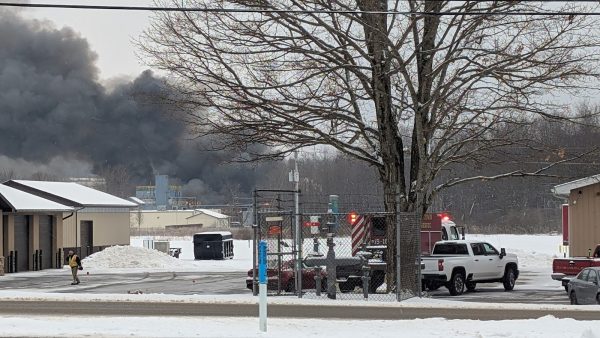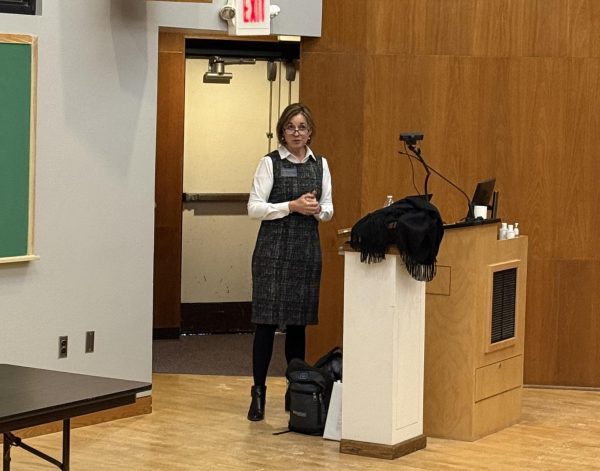The Loop: how it left and how it may return
Yeckley, CATA talk the future of off-campus student transportation
At the Allegheny Student Government’s opening General Assembly on Aug. 30, ASG President Veronica Green, ’23, announced that the Loop — a partnership between ASG and the local Crawford Area Transportation Authority — would be permanently parked. The Loop offered twice-weekly service from stops on-campus to locations in Meadville, from the Downtown area to Walmart and The Movies at Meadville.
“The contract that was negotiated last year between CATA and ASG was exploitative of CATA services and was not a fair contract,” Green wrote in an email to The Campus.
The Loop was ASG’s longtime answer to students’ desire for more off-campus transportation options. After debuting in November 1999 with student drivers and taking students from campus to downtown Meadville, the service was transferred to CATA control in September 2000 due to logistical and liability concerns. In March 2020, the service was suspended due to the COVID-19 pandemic before returning on Oct. 2 of that year. Just two weeks later, on Oct. 14, the line was formally canceled due to less than 20 students riding the bus.
“Those ridership numbers are too low to keep that route in operation for the fall semester,” CATA General Manager Tim Geibel told The Meadville Tribune at the time. “In January, CATA will reassess whether to offer the route for the spring semester.”
According to CATA Assistant Executive Director Kristin Hauser, the shuttle returned in the 2021-22 academic year, though driver shortages across the board limited both the authority’s normal bus routes and eventually contributed to the Loop closing again.
“This year, we still have a driver shortage,” Hauser said. “We’re getting really close to being able to go back to full service, and we are talking with the college to readdress the Loop and get something going, hopefully for next semester.”
At this point, however, Hauser said the conversations are just getting started, and will depend on what the college’s needs are.
Green wrote that ridership stayed low last year in part due to a new shuttle offered by Mickey’s — a bar in town above the Firehouse Tap & Grill on Park Avenue.
“The main motivation for bringing the Loop back post-covid was for transportation to and from the bars on Friday and Saturday nights,” Green wrote. “As a local bar has its own shuttle and students were not utilizing the Loop. It was a waste of their time and CATA was losing money due to the contract.”
Sean Miller, one of the owners of Firehouse and Mickey’s, said that he was told by the college that CATA was struggling to staff the service during the pandemic. So last year, he turned a 28-seat bus once intended for family trips into a ferry for thirsty Gators.
“I had originally reached out and tried to find out what was going on with the Loop from CATA, and (the college) said they were told that CATA didn’t have enough bus drivers to run the Loop,” Miller said. “Last year I did see the Loop was back up and running, but most of the students were coming on the bus that we provided.”
Firehouse’s 28-seat shuttle runs every Friday and Saturday from around 10 or 10:30 p.m. until the last student leaves the bar. Students are not charged for the trips, though tips are accepted through mobile payment services like Cashapp and Venmo. The service is relatively discreet, with Miller using social media platforms to get in touch with interested students.
“A lot of students have my Snapchat, my Instagram, and they’ll send me messages saying ‘Hey, can you come pick us up here,’” Miller said. “This year we’re trying to actually run a loop where it comes up every 15 minutes.”
Though Miller is trying to establish more concrete stops at places like College Court, North Village II, and the corner of Loomis Street and Main Street, he will not advertise the service more publicly.
“It’s just all word of mouth among the college students,” Miller said. “I don’t want to advertise too much because then who’s getting on the bus? I’d rather it just be the college students.”
While the shuttle makes business sense for Firehouse — Miller said the vast majority of his clientele on Saturdays are Gators — the shuttle is also aimed at keeping students safe.
“I would have loved, when I was in college, to have something like that, to be able to get home without having to worry about that,” Miller said. “I just want people to have a good time and get home safe; that was the main reason we started this.”
Interim Dean of Students Trae Yeckley emphasized that Firehouse’s service is a private one.
“That is not an Allegheny-run shuttle,” Yeckley said. “That is also not a City of Meadville or a CATA shuttle, so ride with caution. We can’t tell (students) what (they) can and cannot do, but that is not an Allegheny shuttle. We don’t have a relationship or partnership with that particular bar.”
Though the Loop is discontinued, CATA still offers its standard routes. During the week, the Red route runs from the college to Downtown, the Green route from just off campus to Downtown, Walmart and The Movies, and the Blue route from Downtown to the YMCA and Meadville Area Senior High School. The Combined route runs on weekday evenings and Saturdays, and groups all of CATA’s stops into a single long route.
Allegheny students can ride these buses free of charge, and with an increase in the number of drivers, CATA is planning on expanding their hours starting on Monday, Oct. 10.
“Right now, the biggest thing is opening up full service in Meadville on those Red, Blue and Green routes to be able to go later into the evening,” Hauser said. “I think that’s something that the students will appreciate — or that we hope they’ll appreciate and take advantage of.”
CATA also offers a “Meadville Bike Share” program, where riders can rent a bike from one of several stations across the city at a rate of $2.50 an hour, and return them at any station. Currently, there is only one station on campus, right outside Lawrence Lee Pelletier Library.
“We’d like to see additional sites for bike share on the campus,” Hauser said. “Of course, we’re open to any ideas that student government or the college would have to see if it’s something we can do.”
Beyond CATA, private ventures like Miller’s or just snagging a ride with friends, Yeckley said the administration bears some responsibility for students’ transportation while they are on campus. They noted that the administration is the one who asks students to attend the college in the first place.
“We think it’s a lot to ask for a student organization to focus on the transportation issue as a whole; as a whole they’re dealing with so many other things as well,” Yeckley said. “We know that this is an important thing to the students, and I didn’t want to feel like, ‘okay, well students you want this, you take care of it.’”
Thus, Yeckley and other members of the college administration have been working on a plan to expand student mobility across the board, including transportation to airports on breaks and emergency return trips home, accessible transportation around campus and, coming soonest, a point-to-point service for students to get places within the immediate vicinity.
“The plan is to have a service where students can request a ride to someplace within about a 25 to 30 mile radius,” Yeckley said “They’d submit a form at least 24 hours, prior to where they need the ride to — doctor’s appointments, storage units, pharmacies, things like that.”
According to Yeckley, this idea is in response to a need for students to have transportation to essential off-campus activities such as medical appointments. Yeckley clarified that the program will not be available to students in case of non-essential reasons.
“It wouldn’t necessarily be like, ‘oh, I can just check out a shuttle to take me to dinner,’” Yeckley said. “It would have to be kind of a criteria of … specific things that students could use it for.”
The plan is to centralize the college’s fleet of vans under the Office of Public Safety. That way, if a student is expecting a ride, they can call into public safety’s dispatch for assistance.
Yeckley said that the last remaining piece for this point-to-point service is the hiring of students as van drivers.
“If the students want this service, we need student workers to help deliver the service.” Yeckley said. “We have the vans, we already have the logos for the sides of the vans, as soon as we start hiring students and get them into place, we’ll do a rollout.”
Yeckely added that the leases are coming to an end on some of the college’s van fleet, which means that the new plans include possible upgrades to the vehicles.
“We want to get an ADA-accessible van, we’re looking at electric (vans), we’re looking at all the options,” Yeckely said. “We realized that what we currently have aren’t the most eco-friendly and we’re looking at the options of how we can have the least impact on the environment while serving the needs of our students.”
Allegheny’s transportation system extends beyond the county and immediate region; the college already offers shuttles to Pittsburgh International Airport at the beginning and end of summer, Thanksgiving, and spring and winter breaks. Yeckley said they are working to expand break transportation to better accommodate students coming from across the country and around the world.
“We’re just trying to find better ways to improve that,” Yeckley said. “Different hours of picking up the airports, and are we going to stick with just Pittsburgh or are we going to include Cleveland? That’s a conversation that’s currently happening right now: How do we make break transportation more convenient, especially for students coming in from the West Coast?
Once the point-to-point system is in place and staffed, Yeckley said that a new Loop — driven by students in college vans — may start ferrying students to Walmart as the original Loop once did.
“We can’t accommodate everything, but we want students to know that we hear their needs,” Yeckley said. “We are working on addressing their needs and we’re not just saying, ‘oh we’re gonna fix it eventually’ — there is a plan, and in order to get the plan rolling, we actually need student involvement to help us run this system.”

Sami Mirza is a senior from many different places. He is majoring in International Studies with a focus on the Middle East and North Africa and minor in...





